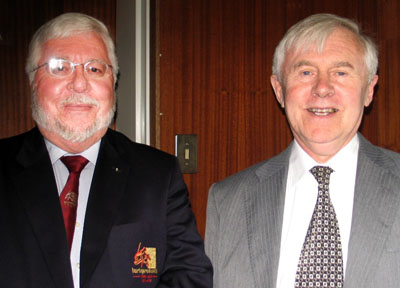Latest News Archive
Please select Category, Year, and then Month to display items
09 November 2018
|
Story Charlene Stanley
|
Photo Charlene Stanley
 Dr Tseliso Ntili, HOD of the Free State Department of Water and Sanitation, warns that pollution caused by mismanagement of municipal water-treatment works puts severe pressure on the province’s water security.
Dr Tseliso Ntili, HOD of the Free State Department of Water and Sanitation, warns that pollution caused by mismanagement of municipal water-treatment works puts severe pressure on the province’s water security.
“Despite our water challenges, Bloemfontein will never become a second Cape Town.” This firm assurance was given by Dr Tseliso Ntili, HOD of the Free State Department of Water and Sanitation, during his presentation at the recent regional seminar of the Faculty of Law’s Environmental Law Association.
The theme of the seminar was Water Quality and Water Security in Bloemfontein and was attended by staff and students from the Faculty of Law and the Faculty of Natural and Agricultural Sciences, as well as relevant role players from private, business, and government sectors.
Not enough water for city’s needs
Water restrictions in some form do seem to remain part of our future landscape though, as Dr Ntsili explained that the city’s current water yield of 218 megalitres per day still fell short of the demand of 259 megalitres per day.
Pollution and mismanagement at municipal level
He pointed out that a big cause for concern was that 75% of the Free State’s waste-water treatment works were dysfunctional. Housekeeping and security at these plants are often severely neglected. Yet, it is difficult for the Department of Water and Sanitation to act against offending municipalities.
“In intra-governmental disputes, the courts must be satisfied that organs of state have taken all reasonable steps to settle contentions – which can be a time-consuming process,” he explained.
Dr Ntsili said that the Caledon River System’s dwindling water levels due to low rainfall and siltation was also a concern, but that plans were underway to supplement the water supply to Bloemfontein via the Gariep Dam by 2026.
However, he warned that poor water management could drastically affect these long-term plans.
“If we can’t manage pollution, the cost will be high. Water security will be challenged, and we will have water shortages – not because of drought, but because of negligence.”
First lecture in Law Dean's series presented
2010-10-22
 |
Prof. Johan Henning, Dean of the Faculty of Law at the UFS and Prof. Johan Farrar, a well respected Corporate Law Specialist, at the recent first lecture in the Law Dean’s Prestige Lecture Series.
Photo: Lize du Plessis
|
| Prof. John Farrar, a well respected Corporate Law Specialist of high international repute, delivered the first lecture in the Law Dean’s Prestige Lecture Series at the University of the Free State (UFS). The theme of his paper was Directors’ duties of care – Issues of classification, solvency and business judgement and the dangers of legal transplants.
The topic is of the utmost importance to South African lawyers in view of the very contentious provisions of the new Companies Act 71 of 2008 endeavouring to introduce the business judgement rule into South African Company Law if and thus reforming company directors’ common law duties of care and skill, if when this legislation at long last becomes operative.
Prof. Farrar is a professor of Corporate Governance at the University of Auckland Business School, and joint director of the New Zealand Governance Centre. These are part-time roles and the remainder of his time is spent as emeritus professor of Law at Bond University, Queensland.
Prof. Farrar has extensive experience in Commercial Law Reform, having, for example, acted as a consultant to the New Zealand Treasury, the Law Commission, the Business Council of Australia and the UK Department of Trade and Industry.
|